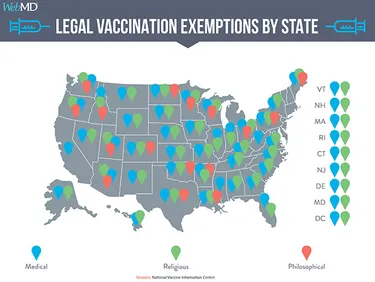But some states are going the other way on COVID-19 vaccine requirements. As of July 18 2018 all 50 states and DC require vaccinations for diphtheria tetanus and pertussis.
 Vaccination Policy In The United States Wikipedia
Vaccination Policy In The United States Wikipedia
Most islands in the state are vaccinating individuals age 16 and older.

Vaccine requirements by state. States may also require immunization of healthcare workers and of patientsresidents of healthcare facilities. The United States has cleared an important milestone in its vaccine rollout. All people 12 and older are now eligible for the coronavirus vaccine in at least 49 states.
At least 40 states creating legislation that would ban vaccine requirements. These laws often apply not only to children attending public schools but also to those attending private schools and day care facilities. At least 123917385 people or 37 of the population have received at least one dose.
Will ask for proof of employment. State Vaccination Requirements State laws establish vaccination requirements for school children. Illinois - Has residency requirements but includes part-time residents.
No US federal vaccination laws exist but all 50 states have laws requiring children attending public school to be vaccinated against diphtheria tetanus and pertussis generally in a DTaP vaccine. 43 states and DC require hepatitis B vaccination Alabama Illinois Maine Montana Rhode Island South Dakota and Texas do not to enter kindergarten. The policy and related implementation details.
Polio an IPV vaccine. And the varicella chickenpox vaccination. Alaska became the first state to eliminate vaccine eligibility requirements for adults on March 9.
The order also permits state and local health departments to require people to provide evidence of vaccination during a Covid-19 outbreak investigation Montana. Idaho - Requires proof of residency or work in the state in order to get vaccine. On April 1 all Montanans 16 years and older will be eligible for vaccination Gov.
All 50 states allow medical exemptions 44 states allow religious exemptions and 15 states. Most states have vaccination requirements for both groups although whether people can be exempt on religious or philosophical grounds varies state to state. Every adult living or working in the state is eligible to receive a vaccine.
The island of Oahu is vaccinating adults age 50 and older. Measles and rubella 49 states and DC also require mumps vaccination. Measles and rubella generally in an MMR vaccine.
State laws establish vaccination requirements for school children. Indiana - Has residency requirements but is open to people who work in the state. At least two Hawaii and New York have considered legislation that.
Prior to the implementation of any changes to the CSUs existing immunization requirements the CSU will engage the California State Student Association the CSU Academic Senate and labor unions. All incoming students under 21 years of age. Hawaii distributes its vaccines to hubs throughout the state.
NEW YORK NewsNation Now At state. State laws also establish mechanisms for enforcement of school vaccination requirements. People 60 and older and those 16 and up with a wider range of medical.
Greg Gianforte said Tuesday. These laws often apply not only to children attending public schools but also to those attending private schools and day care facilities. In the US 250998265 doses have been distributed so far with 77 or 194791836 of the doses used.
Public colleges universities. Overall 69211473 people or 21 of the population have been fully vaccinated. The COVID-19 vaccination requirement would allow for students or employees to seek an exemption based on medical or religious grounds.
WJTV Nexstar Broadcasting Apr 29 2021 News 6. 52 Zeilen All 50 states have legislation requiring specified vaccines for students. All states provide medical exemptions and some state laws also offer exemptions for religious andor philosophical reasons.
